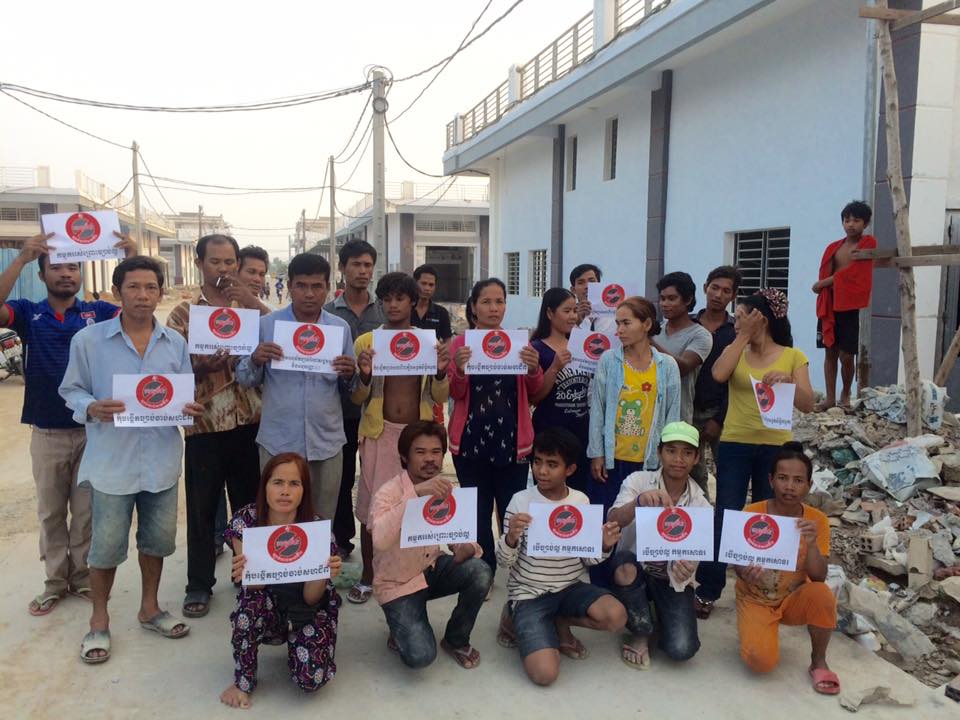
Mar 30, 2016
Workers across Cambodia are waging rallies to protest a draft labor law that, according to the International Trade Union Confederation (ITUC), does not meet basic worker rights standards under international law.
Carrying signs reading, “Do not create a law that oppresses worker rights” and “Workers survive because of good laws,” workers are taking a stand against the law that, if passed, would violate International Labor Organization (ILO) standards on freedom of association and protection for the right to form unions (Convention 87) and the right to bargain collectively (Convention 98).
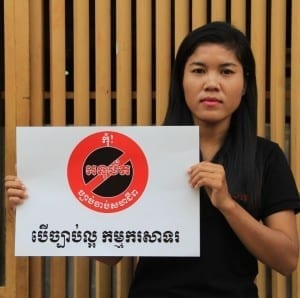
Cambodia’s draft labor law would make it easier for the government to break up unions. Credit: Um Mumsreypech
Workers from a wide variety of jobs also are posting on Facebook images of themselves and their co-workers with signs urging the government to pass a law that respects the rights of workers. (You also can follow the actions on Twitter with the hashtag #SayNoUnionLaw.)
In a letter sent this month to Cambodian Prime Minister Hun Sen, ITUC General Secretary Sharan Burrow urged the Cambodian government to work with unions to ensure the law is consistent with international labor standards. “We shall oppose any law which does not fully respect these rights,” Burrow wrote.
For instance, a strike would be legal only if approved by more than 50 percent of participants at a union meeting where more than half the union members are present—effectively making strikes impossible for unions with several thousand members.
The strike provision would especially impact the nation’s 700,000 garment workers, limiting their ability to seek improvements at the workplace. A Human Rights Watch report last year found that many Cambodian garment factories repeatedly violated fundamental worker rights, such as issuing unlawful short-term contracts to intimidate and control workers, and to avoid paying maternity leave and other benefits to the predominantly female workforce.
Ath Thorn, president of the Coalition of Cambodian Apparel Workers Democratic Union, told The Cambodia Daily that the limitations on calling a strike are a big concern. “In the Constitution, even one person can make a strike or demonstration,” he said. The Constitution says the right to strike and demonstrate “shall be exercised within the framework of law.”
The draft law also would enable courts to break up unions for infractions committed by a union leader.
Workers and their unions, along with community advocates, had worked on a draft trade union law several years ago that incorporated fundamental worker rights, but the draft died on the desks of the Council of Ministers. Cambodia union leaders say the current draft was compiled with minimal input from workers and their unions. It now goes before the National Assembly April 4.
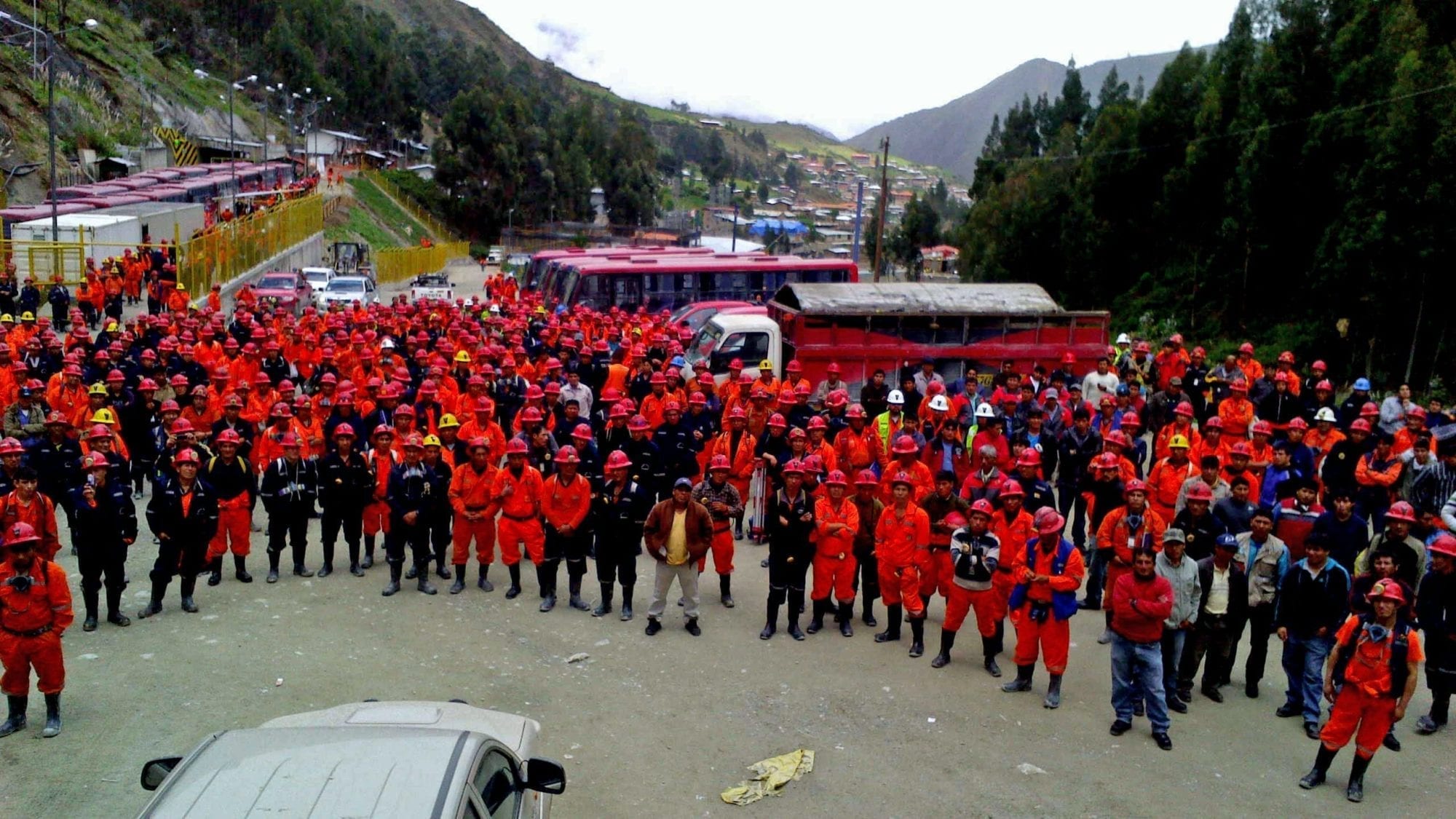
Mar 29, 2016
Oscar Muro, Solidarity Center program officer in Peru, reports on his late February fact-finding journey to the Minera Aurifera Retamas (MARSA) mine, where subcontracted mineworkers, represented by a strong union, won a national labor inspection finding that calls for 2,464 outsourced workers to be moved to permanent contracts. The workers subsequently went on a weeklong strike to protest the employer’s appeal of the judgment and a ruling by the regional labor authorities that MARSA should not be fined for misclassifying workers. The national labor inspection office indicates it will return to the mine in a few weeks to ensure the company has correctly classified miners.
……………..
Together with Ricardo Juárez, secretary-general of the Federation of Mine and Metalworkers of Peru, and Elder Villalobos, secretary general of the union of workers of the companies of MARSA, I traveled to the mining center in the mountains of La Libertad to attend the union’s extraordinary general assembly. There, the secretary general told the 4,500 workers in attendance that, following mine inspections, the national Superintendent of Labor Inspection had ruled in favor of 2,464 of 4,000 subcontracted workers, stipulating that they become permanent workers.
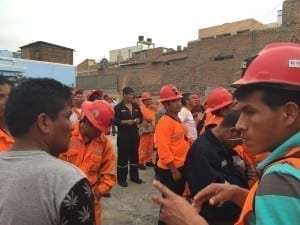
Miners are standing strong in their demands for permanent contracts. Credit: Solidarity Center/Samantha Tate
Many MARSA workers have labored in dangerous conditions for up to 20 years, but without a contract. Their “non-permanent” status means their livelihoods are jeopardized if they raise safety issues with their employer, or demand decent wages that allow for a life with dignity.
In January, one miner died on the job, and two miners perished in 2014. In November 2015, there was a deadly radiation poisoning and suffocation incident at the Taurus mine.
Mine is Rich, Yet Residents still Poor
The MARSA mine, 4,000 feet above sea level in the Southern Highlands, produces gold in large quantities and ranks among Peru’s top five gold producers. The journey to MARSA takes more than 14 hours from the northwestern coastal city of Trujillo. To reach the mining center, we had to cross hill after hill on a single-lane road. When our bus encountered a vehicle coming the opposite direction, the vehicles struggled to pass each other on the narrow stone trail. We made the trip to join our co-workers who need us, and thank God, everything went well.
Some 7,000 people live in Llacuabamba, the village where the MARSA mine is located. Despite the wealth beneath their soil, the residents do no benefit from investment, such as proceeds from mining licenses. Instead, their village suffers from poor sanitation infrastructure and is so isolated that residents do not receive newspapers and often do not have access to television because of the weak Internet signal.
Solidarity with Miners
Together with Juárez and Villalobos, we conveyed to the workers that we stand in solidarity with them in their struggle until they achieve victory: worker rights through permanent contracts.
During this journey, we also learned about informal mines in the area, which employ between 3,000 and 5,000 miners. Further, at the nearby Consortium Horizon mine, the more than 4,000 employees have sought to form a union several times, only to see many workers fired. We have much work ahead to assist all of these workers in getting permanent contracts and the safe and healthy working conditions all workers deserve.
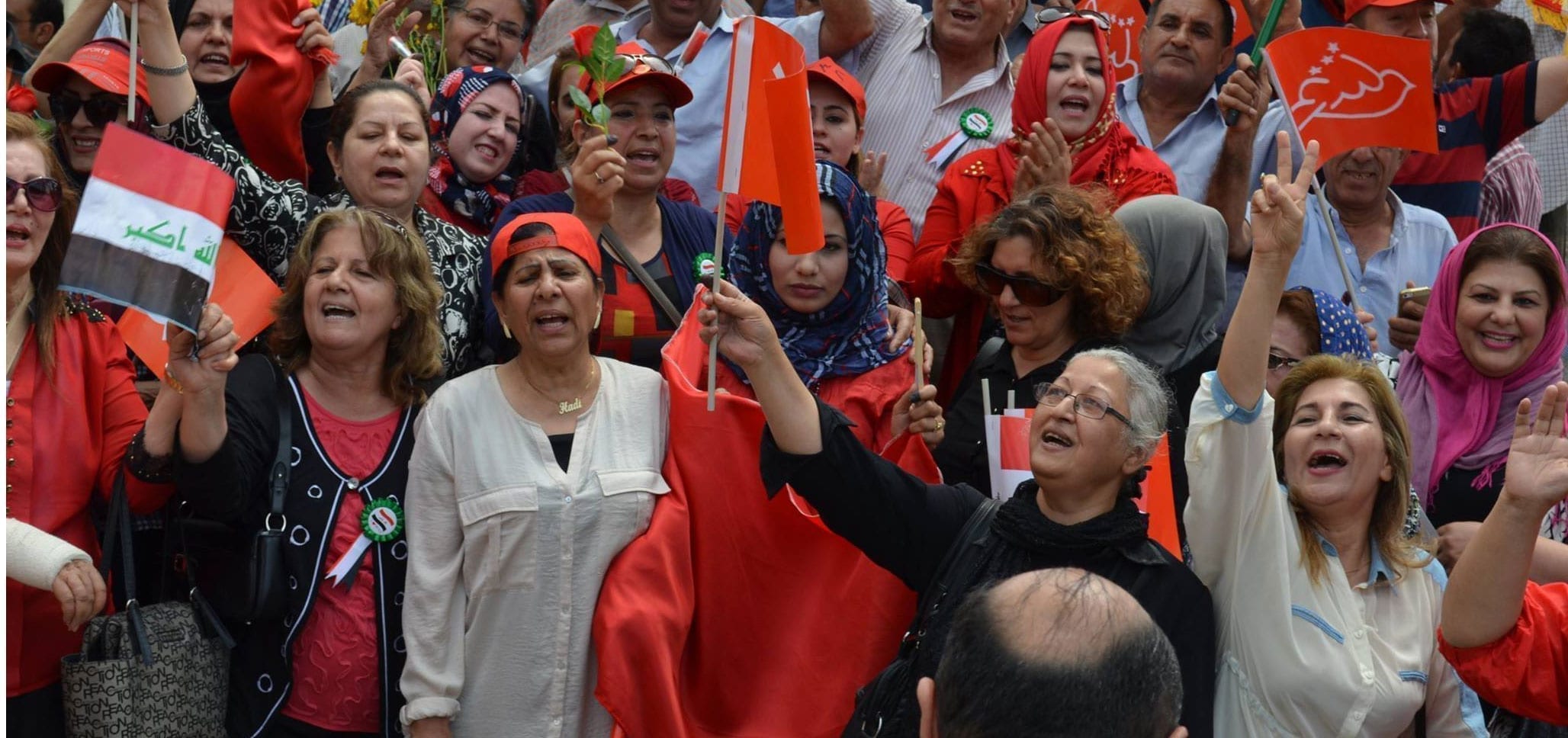
Mar 23, 2016
Women workers made important gains under Iraq’s new labor law, the country’s first ever to prohibit sexual harassment at the workplace. The law clearly defines sexual harassment and specifies penalties for perpetrators. Women union activists led their unions in fighting for this protection.
“The law also addresses the arbitrary dismissal of workers and other issues that will serve the interests of working women, which should encourage more women to work and enjoy those protections and rights,” says Saba Qasim Yousef, an officer in the women’s affairs department of the Iraqi Federation of Oil Unions (IFOU). Yousef was among many women taking an active role in the union movement’s labor law campaign.
Crucially, the law aims for gender equality, specifically regarding wages, hiring and working conditions. It requires employers to provide onsite child care, and increases paid maternity leave to 14 weeks, with the option of additional unpaid leave for up to a year. Employers must allow woman workers to return to their jobs or equivalent positions.
In effect on February 1, the law was a massive victory for Iraq workers and their unions and followed the Iraq union movement’s three-year campaign for passage of a labor law in line with International Labor Organization (ILO) conventions. The Solidarity Center provided essential support to the union movement throughout the campaign.

Iraq’s labor law includes protection against workplace sexual harassment. Credit: GFITU
Women Union Members Took Key Role in Drafting Labor Law
The labor law’s provisions addressing gender equality came about because women union activists and leaders participated in all aspects of the campaign—drafting amendments, taking part in conferences and meetings with parliament and the Ministry of Labor and Social Affairs (MoLSA) and advocating for its passage.
“Women had a leading role in the campaign to restructure the law draft by participating in the workshops and seminars,” says Ilham Abdul Ma’boud Majid, president of the Telecommunications Union, General Federation of Workers and Unions in Iraq (GFWUI), Basra Branch.
“Also, they were watching the developments in the process, despite their obligations as employees and mothers at home and the long distances they needed to travel to attend those activities,” she said. “They were motivated by the idea of having a modern labor law that will protect them from all kinds of discrimination.”
Labor Law Will Encourage Women to Join Workforce
The law’s new protections “will have a positive impact in increasing the number of women workers and guaranteeing their strong presence in the labor market, by treating them fairly at their workplaces with equality in terms of assignments and jobs,” says Alya’a Hussien Mahood, women’s affairs officer for the General Federation of Iraqi Trade Unions (GFITU).
The final draft, passed late last year, retained the unions’ input and is a significant victory for all workers because it expands coverage to workers not included in the civil service law. This means that workers in the public sector who are not civil servants have the chance to join and establish their own unions.
The law allows for collective bargaining, including for workers without a union, and provides a good frame for freedom of association and protections for unions and their members. It further limits child labor, improves rights for migrant workers, provides better protections against discrimination at work and is the country’s first legislation to address sexual harassment at work. The law also enshrines the right to strike, banned since 1987. (Highlights of the law’s improvements.)
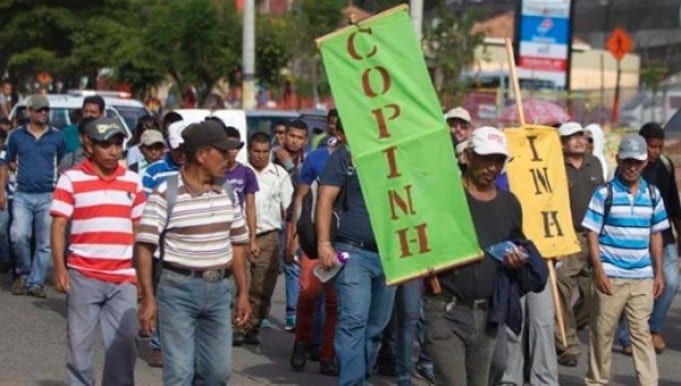
Mar 18, 2016
The murder of a second Honduran rights activist, Nelson Noé García this week, days after the assassination of Berta Cáceres, a globally recognized leader for indigenous rights and environmental justice, has widened international outrage and amplified demands for justice, security, respect for basic rights and an end to impunity for perpetrators.
The Center for International Justice and Rights strongly condemned Nelson’s murder. Marcia Aguiluz, CIJR director for Central America and Mexico, said it “proves that the spiral of violence against indigenous peoples fighting for their territories in Honduras remains with impunity.”
García, 38, a father of five, was a member of the Council of Indigenous and Popular Organizations of Honduras (COPINH), co-founded by Cáceres. Local media report that García received four gun shots to the face and suggest the attack followed the forceful eviction of at least 150 families in the village of Tilapia by military police.
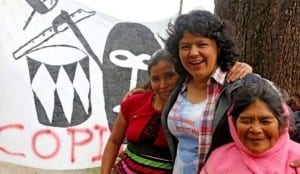
Berta Cáceres (center), murdered March 3, won the prestigious Goldman Environmental Prize for her opposition to one of the region’s biggest hydroelectric projects. Credit: Democracy Now!
The same day as García’s murder, the president of Unified Campesino Movement of the Aguán, another indigenous group, was briefly arrested on questionable charges; Cristián Alegría, a campesino activist, was shot at; and David Romero, a journalist critical of the government, was sentenced to 10 years in prison. In addition, Gustavo Castro, a Mexican activist who witnessed Cáceres’s murder, has been prevented from leaving the country.
Targeted murders of human rights activists and union members have helped make Honduras one of the most dangerous countries in the world for human rights defenders.
Union activists are targeted to silence demands for economic justice, freedom of association and other basic rights. Over the past 12 months, the Solidarity Center has documented 13 cases of threats or violence against union activists, including the disappearance of Donatilo Jiménez in April 2015, the murder of Héctor Martínez Motiño in June, and repeated death threats against longtime Solidarity Center allies Tomas Membreno and Nelson Geovanni Nuñez Chávez, both of the Sindicato de Trabajadores de la Agroindustria y Similares (STAS) industrial agricultural workers’ union.
In the United States, more than 60 Congress members yesterday asked Secretary of State John Kerry and Treasury Secretary Jacob Lew to suspend aid to Honduras security until an international investigation into the murder of Cáceres.
The Inter-American Commission on Human Rights had mandated “precautionary measures” to protect Cáceres, Motiño and Jiménez—which were not borne out in practice. This week, 23 U.S. Congress members sent a letter to U.S. Secretary of State John Kerry urging the State Department to take concrete action to address the situation of activists in Honduras.
The AFL-CIO has expressed deep concern with human rights and sustainable development in Honduras based on the findings of an October 2014 labor delegation that met with labor and community organizations, the Honduran government and the U.S. embassy.
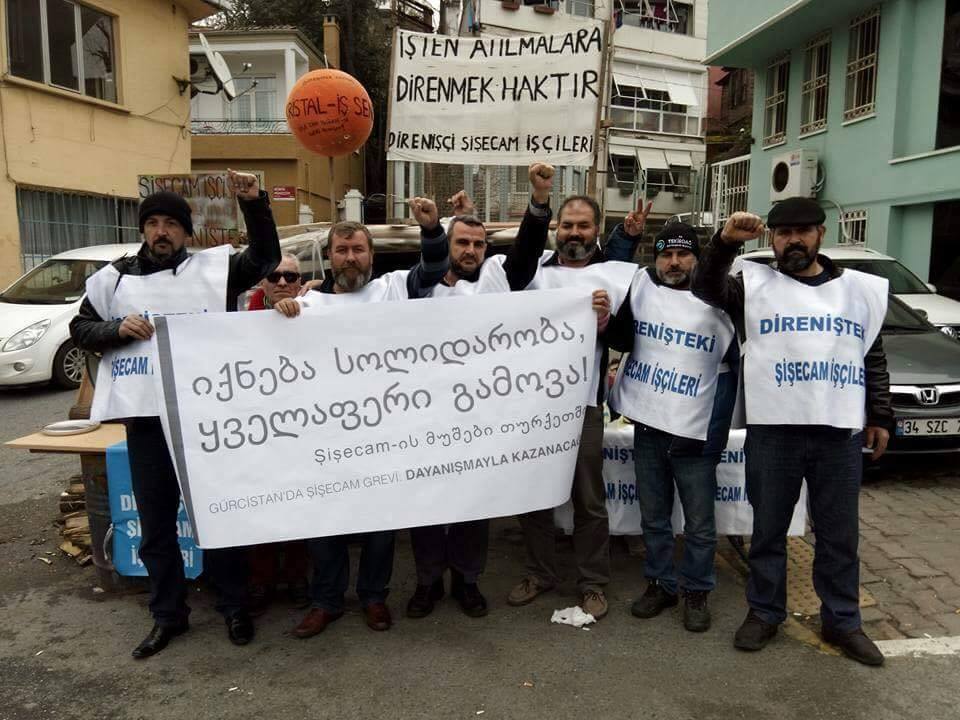
Mar 17, 2016
In Georgia, coal miners in Tkibuli and glass factory workers in Ksani recently made big gains at the workplace with the assistance of the Metal Workers, Miners and Chemical Industry Workers’ Trade Union (MMCIWTU) and the Georgian Trade Unions Confederation (GTUC).
Despite tough opposition from their employers, both groups of workers waged successful strikes and won significant wage increases, with miners also gaining key job safety and health improvements.
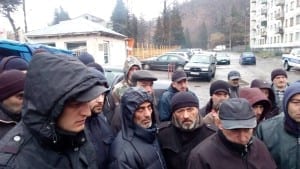
Miners in Georgia won key contract demands, including a wage increase and improved job safety and health. Credit: MMCIWTU
Some 750 miners went on strike in February, seeking wage increases promised during their last strike in 2011. The workers, employed by the Georgian Industrial Group (GIG), which operates two mines in Tkibuli, walked out before notifying union leadership of their intention.
But with GTUC President Irakli Petriashvili and MMCIWTU President Tamazi Dolaberidze at the bargaining table, miners returned to work in 16 days with a new contract that includes a 7 percent pay increase starting March 1 and an additional 3 percent hike beginning April 1—and will be paid for half of the days they spent on the strike with no punishment for strike leaders. The company also has agreed to address salary imbalances.
GIG supplies coal from Tkibuli primarily to cement-producing factories in Georgia and is one of the country’s largest corporations, with operations in energy generation, natural gas and real estate.
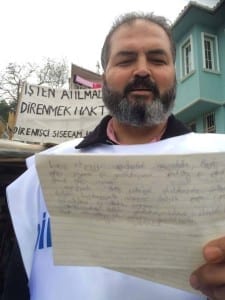
JSC Mina factory workers received wide international support for their strike. Credit: MMCIWTU
At the JSC “Mina” glass container factory, 170 workers—80 percent of the workforce—went on strike February 5 after months of contract negotiations which stalled when the company did not address workers’ key issues, including a wage increase.
Throughout the 30-day strike, glass workers won wide international support, with employees of the JSC Mina Turkey-based parent company, Sisecam, holding a solidarity action backing striking workers. The Sisecam workers also sent their Georgian brothers and sisters a message: “Workers of “Mina” are symbol of fight for just cause, wherever human rights are violated we should be there and fight together!”
The global union federation IndustriALL, the Eurasian Metal Workers Federation, the Turkish union DISK and unions in Ukraine, Russia, Belarus, and Kyrgyzstan sent protest letters to the company and support letters to the glass workers. GTUC affiliate organizations and non-governmental organizations also backed the workers.
Petriashvili and Dolaberidze ultimately negotiated a 7.5 percent pay increase beginning January 1, 2017, and the company agreed to the workers’ demand for a location to hold union activities.











